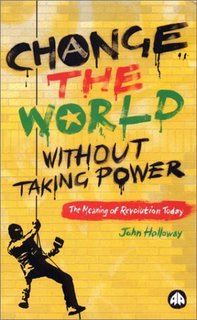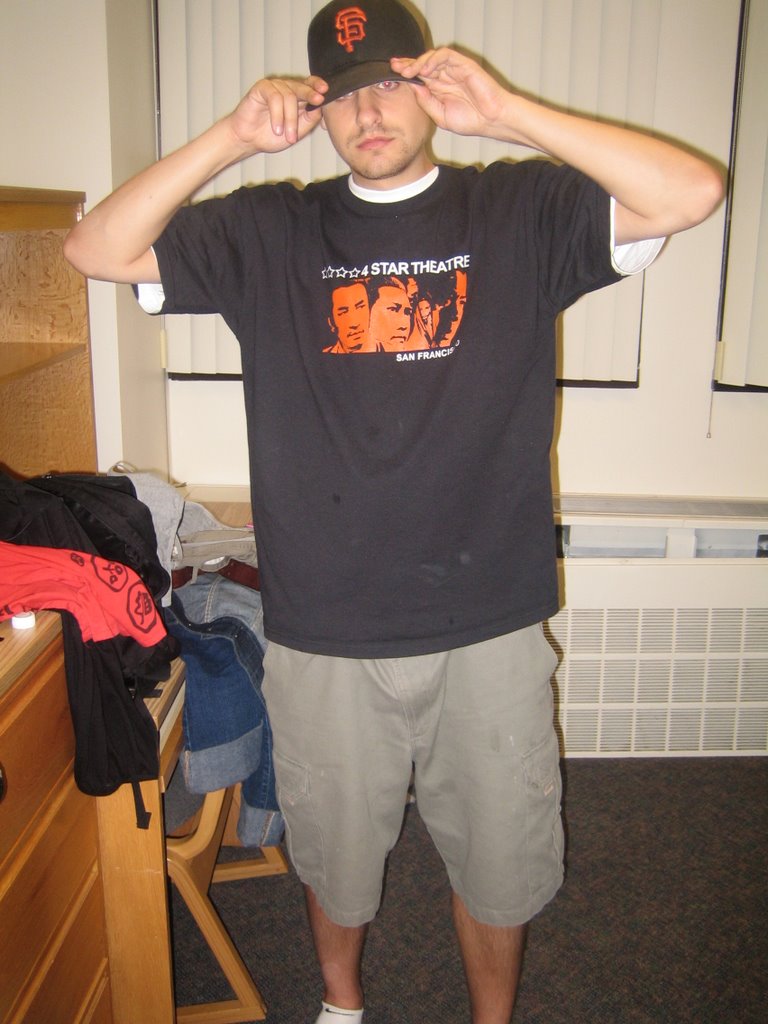 The Meaning of Revolution Today? (part I)
The Meaning of Revolution Today? (part I)Though (like most academic texts) I have had a hard time getting through parts of it, to me John Holloways book entitled "Change the World Without Taking Power" is one of the most important texts (theory wise) to have been published in several years. The description on its publishers website writes:
"The wave of political demonstrations since Seattle have crystallised a new trend in left-wing politics. Modern protest movements are grounding their actions in both Marxism and Anarchism, fighting for radical social change in terms that have nothing to do with the taking of state power. This is in clear opposition to the traditional Marxist theory of revolution which centres on taking state power. In this book, John Holloway asks how we can reformulate our understanding of revolution as the struggle against power, not for power.
After a century of failed attempts by revolutionary and reformist movements to bring about radical social change, the concept of revolution itself is in crisis. John Holloway opens up the theoretical debate, reposing some of the basic concepts of Marxism in a critical development of the subversive Marxist tradition represented by Adorno, Bloch and Lukacs, amongst others, and grounded in a rethinking of Marx's concept of 'fetishisation'-- how doing is transformed into being."
Im not going to try and wax poetic about Holloways theories before I actually do some deeper reading of the book, but like many, looking for an alternative to state centered strategies for radical social change I am excited by some of the things Holloway brings to the for-front and the debates that the book has launched across the world. Of course the book and his subsequent essays have caused a tremendous amount of critique (most notably by such writers as Tariq Ali). Radicals who have for large parts of their lives conceived of the revolutionary project as primarily a 'project focused on the overthrow of the capitalist class by the (industrial) working class' who would then go on to establish one or another form of 'dictatorship of the proletariat' -- have, as would be expected reacted overwhelmingly sceptical to Holloways writings. Some, like Tariq Ali, have pointed to Hugo Chavez and the Bolivarian Revolution in Venezuela (itself an electorally based movement, which operates in parallel to the 'corporate-capitalist' class up until this point) as an example of how the only way to change things will still be through state power.
To me though, (and im actually fairly excited about whats going on in Venezuela - although much remains to be seen), it has been clear (whether through electoral or military means) that historically the state socialist project has failed 'the people' and perhaps more importantly, it has distorted the idea of revolution to the point where very few people still even identify with the term (at least in the US). On some levels this probably has some positive side effects since many people are re-thinking what (big R) Revolution actually looks like and are trying to (like Holloway) theorize new ways of radically transforming society -- but in general its clear this idea of the power of the people to change things is at a fairly low level. Revolution in the US exists in the slogans of multinational corporations ("revolutionizing the way you look at banking"), on the trendy Che Guevara t-shirts you see on every street corner, and among the Academic Left -- a sector which is currently hopelessley out of touch with any real social movements based in this country. On the other side you still have various left groupings (or sects), prodominantly Trotskyists and Maoists but also Anarchists, who have dealt with the lack of real broad based, working class, revolutionary movements by simply becoming more schrill and isolating in their rhetoric. Rather then contributing to a larger anti-capitalist dialogue though, these groupings have (in my opinion) simply made the radical left more unattractive.
So.... what is a (r)evolutionary to do?
More on this topic tomorrow, but in the meantime for anyone in or around the New York City area, check out this class starting on Thursday nights at the Brecht Forum, February 16th entitled 'The meaning of revolution today?"
Teachers/Facilitators: Ayça Çubukçu & David Graeber
This six session study group will explore closely John Holloway's Change the World Without Taking Power: The Meaning of Revolution Today, in reference to both contemporary political theory and action. Holloway's book has sparked some of the most engaging debates that the alter-globalization movement has produced, concerning questions that range from the lessons of Zapatismo to questions of "power" and the state; from desirable revolutionary strategies to their implication in the problems these strategies seek to counter in the first place. The seminar will engage with these critical debates (with complimentary provocation from Antonio Negri and Giorgio Agamben) that our movements need to address - if not resolve- in action.

No comments:
Post a Comment